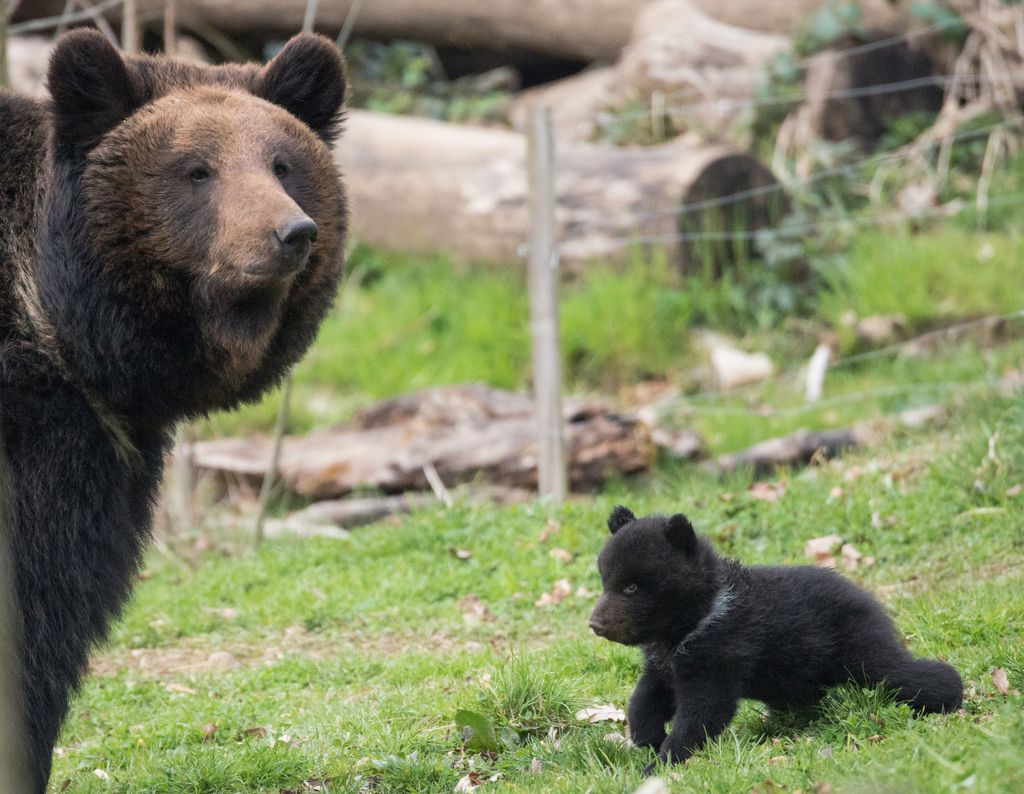
Double bear cub death raises captivity questions

A bear cub at Bern’s zoo has been put to sleep five days after its sibling was killed by their father in front of a shocked public. The incidents have brought up questions over how best to deal with reproduction among animals raised by humans.
Zoo authorities say they were left with no option after the second cub was rejected by its mother and the father showed intent to hurt it as well.
The male black grizzly “Misha” killed his offspring on April 2 by throwing it up in the air repeatedly during a sort of game. Members of the public witnessed the roughhousing and the zoo later announced the cub had died as a result, leading to criticism from animal rights activists and others who said the father bear should have been separated from the mother and cubs to avoid such a fate.
When Misha showed interest in getting violent with the second cub as well, zoo officials decided to euthanise it to prevent further stress and suffering.
Bern zoo officials say attempts at separating the bears resulted in distress for the adults and lack of care for the cubs.
Cornelia Mainini, director of the Bern Bear Park and head of education at the Bern zoo, told swissinfo.ch that Misha and female bear Masha’s experience of having been hand-raised together without a mother left them much more reliant on each other than normal bears, so separating them was “not an option”.
“The father went crazy with stress and became aggressive,” she said. “And Masha went looking for Misha and was no longer interested in her cubs.”
“The loss of young animals, based on biological principles as well as on animal welfare grounds, is less serious than permanent behavioural problems in the adult bears,” zoo officials said in a press release.
The two black grizzly parents – male bear “Misha” and female “Masha” of a subspecies also known as Ussuri brown bears – arrived at Bern Zoo in 2009 as gifts from then-Russian President Dmitri Medvedev.
They are not wild bears, having been found abandoned at 12 weeks old and hand-raised in captivity.
Hand-raising issues
Mainini added that hand-raising the cubs was also not an option because it is the zoo’s policy to “keep interaction between people and animals to a minimum” and avoid attachment issues such as those that arose between Masha and Misha.
Although Masha showed motherly instincts towards her cubs early on, she was consistently very reliant on the presence of Misha and lost interest in the second cub, known as “bear number four”. Its sibling, “bear number 3”, was killed on April 2.
Mainini and other zoo officials do not know why Masha’s motherly instincts suddenly abated after months of successful interaction with her cubs.
Public outcry
Following the second cub’s death, Swiss animal rights organisation ProTier said the zoo had been negligent.
“It is not clear why those in charge were reluctant to separate the father bear,” the organisation said in a press release.
“After the fatal accident with cub number 3, [the zoo] should have responded immediately. Under these circumstances, the death of the second cub was not justifiable from an ethical perspective.”
However, others came to the zoo’s defence, including Martin Wehrle, a veterinarian at the Goldau zoo in canton Schwyz.
“A zoo is no paradise,” he told the SonntagsZeitung, explaining that it was very difficult to predict what animals will do and that the mother bear could just as easily have killed her cubs as a result of having been separated from the father.
A 2008 study of wild grizzly bears in Alaska’s Denali National Park showed that out of 76 bear cub litters, 53 – or 70% – experienced whole or partial litter loss. In 54% of cases, the entire litter was lost.
On Monday, Bern zoo said it would sterilise Misha in order to prevent further cubs from being born.
In Bern’s bear park – another place where the city’s namesake animal can be observed – male bear Finn has also been sterilised. Finn and female bear Björk, both raised in zoos, became the parents of twin cubs in 2009 and the father was separated from the cubs until 2012. Both cubs lived, although one was moved to another zoo because it no longer got along with its mother.

In compliance with the JTI standards
More: SWI swissinfo.ch certified by the Journalism Trust Initiative































You can find an overview of ongoing debates with our journalists here . Please join us!
If you want to start a conversation about a topic raised in this article or want to report factual errors, email us at english@swissinfo.ch.